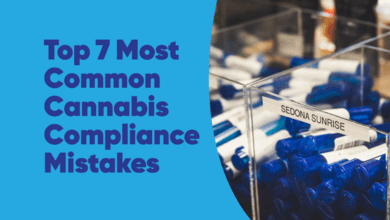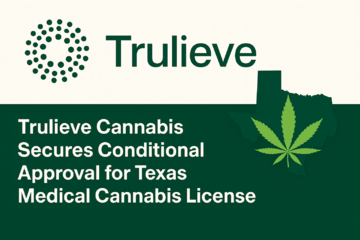
Top 7 Most Common Cannabis Compliance Mistakes
Published on 3/31/22
Compliance in cannabis is a constantly evolving process that doesn't end once you've obtained your proper licensing. In fact, compliance is a major piece of your canna-business. Compliance requirements are different in every state, from wholesale purchasing procedures to consumer purchasing limits. To run your canna-business legally and successfully, it's important to understand your state's laws.
How Cannabis Industry Compliance Requirements Differ State by State
 Unsplash
UnsplashFirst and foremost, let's address a frequently asked question. "What is compliance?" The regulations surrounding cannabis are stringent and often burdensome, and cannabis businesses must follow them to maintain licensing. Cannabis compliance is adhering to your state's laws and regulations surrounding cannabis. Not achieving compliance can mean fines, suspension, or total loss of your license, depending on what regulations you break.
Because cannabis is federally illegal, there are no overarching federal regulations - states must come up with their own regulations and policy frameworks for everything surrounding cannabis, from cultivation and sales to possession and use. Additionally, these policies are known to constantly change, which makes it even more difficult to be fully compliant. As a cannabis business, you are responsible for knowing your state's specific cannabis regulations. Wholesale purchasing is a great example. Who you purchase your cannabis from, how much, and what types are all regulated on a state level. Additionally, each state their own consumer purchasing limit that dispensaries are responsible for regulating. Not only are you responsible for how you purchase your cannabis to sell, but you are also responsible for selling the appropriate amounts to each customer. In California and Colorado, for example, adults at least 21 years old are allowed to purchase up to 28.5 grams of cannabis and up to 8 grams of cannabis concentrate. In New York, adults can purchase up to 3 ounces of cannabis and 24 grams of cannabis concentrate. In Illinois, it's up to 30 grams of cannabis and 5 grams of cannabis concentrate.
Common Cannabis Compliance Mistakes
Holding an Incorrect or Expired License
Everyone knows the feeling of looking down at your ID or credit card and realizing that it has expired. Cannabis businesses are required to keep current with their licenses at different intervals, usually, every one or two years; forgetting to renew your license could end your business. Additionally, make sure you know what license you have. Common types of licenses include retail, dispensary, cultivation, and business - each permits different activities. If you're a dispensary and you want to grow your own weed, make sure your license allows it. Dispensaries get into a lot of trouble for not adhering to the restrictions of their specific license.
Not Following Packing, Labeling, and Product Safety Laws
 Unsplash
UnsplashThe products you sell must follow specific labeling requirements (such as being child-resistant with prominent warning signs about the package's content). Getting this aspect of the business correct can be burdensome and detailed work, so hiring a compliance officer can be the difference between getting it right and getting fined.
Not Having Enough Surveillance Cameras
Every dispensary is required to keep constant surveillance of their store, and every state has specific rules around how many cameras are needed for a given space and how long you have to keep security records. Once you know your state's laws, investing in high-quality surveillance systems is the best way to ensure you will be compliant long into the future.
Violating Customer Privacy
Cannabusinesses collect a lot of information on their customers through transactions, all of which is confidential information. If there is a breach in security, that's on you. To make sure this doesn't happen to your business, invest in proper cyber security software and train your employees on best practices. Require passwords, encrypt any sensitive data, and keep your software updated.
Illegal Marketing or Advertising Methods
Unlike most other industries, state laws mandate that canna-businesses may not partake in paid advertising. TV commercials, billboards, radio, and even Facebook Ads are usually off-limits to canna-businesses. Make sure to read up on what is required by law and come up with a smart marketing plan that doesn't rely on traditional advertising strategies.
Poor Inventory Management
 Unsplash
UnsplashAs a canna-business, you are required by law to keep track of every product that comes in and out of your business. Unaccounted for transactions and/or products can be an honest oversight or a sign that something sketchy is going on. To make sure you're on the up-and-up, an updated POS system with inventory tracking software is highly recommended.
Not Maintaining Financial Data and Records Correctly
Canna-businesses are required to keep detailed track of every transaction, both from customers and the company. The amount of time you must keep these records vary by state (Colorado requires 6-months of on-site records and 3-years of records overall). At the end of the day, if you're numbers don't add up and you're audited, it can lead to serious trouble. Like inventory management, a great solution to this problem is to invest in a quality POS system that provides streamlined sales and financial management that state authorities can easily access.
Failure to Pay Taxes
Alongside maintaining financial records, you've also got to stay on top of your taxes. Each state has very different ways of taxing cannabis, and sometimes the percentages are extreme. Regardless, failing to be tax compliant will result in considerable fines and ongoing audits. Cannabis-specific tax charts, software, and legal representatives are all great ways to make sure you stay on top of paying the correct taxes on time.
Do you own or manage a canna-business? Let us know what state you operate in and what compliance requirements are most commonly broken. Are there any compliances that you think should be retracted? Comment below!



















